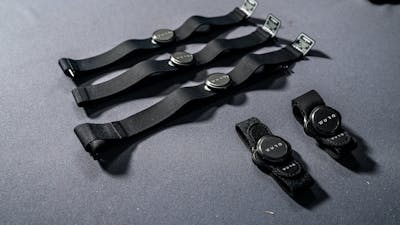Wyss startup WurQ launched in 2023 to bring AI and exercise science to existing wearables to quantify physical work, and assess the amount, quality, and intensity.
The Problem
Athletes undergoing daily training and patients undergoing physical therapy, often do not have a way to quantitatively assess their progress or obtain actionable insights that help to enhance performance or avoid injuries. There are vast options for wearable devices and activity monitors, however, those are generally limited to tracking cardiovascular activities and heart-related data. There is currently no readily accessible product that can track functional and strength training at scale. Nearly 100 million people in the US engage in strength training at least three times a week, and those who take it seriously log every workout manually with no access to performance insights on their strength, endurance, or balance skills.

Our Solution
A team at the Wyss Institute and Harvard School of Engineering and Applied Sciences (SEAS) developed a two-sensor system able to capture movement data, such as body orientation and acceleration, that is then fed into deep learning and signal processing algorithms to analyze movements.
WurQ, how the system is called, recognizes different types of movements, such as bench press or squats; tracks body kinematics, including ranges of motion and speed; and assesses strength-related performance, such as workload completed, power produced, and muscles engaged. The team also developed a mobile application that provides strength performance feedback and gamification tools to the users.
WurQ can be used as a standalone app or be integrated into existing fitness and healthcare ecosystems via application programming interfaces (APIs). It is sport agnostic and can provide seamless tracking and quantification wherever people move. With longer use, WurQ provides personalized generative guidance at scale and performance prediction from users’ historic data.
Product Journey
The WurQ sensors and algorithms were developed in the Biodesign Lab of Wyss Associate Faculty member Conor Walsh, Ph.D., whose research specializes in wearable robotic devices. A project team led by Dmitry Popov, Ph.D., with background in robotics and passion for sports, built upon some of the lab’s previous work to develop a product that could benefit users in this space.
It always felt that the cardio space is more fun with all its community and rewards enabled by progress visualization, sharing, and competitions. That’s when the idea of a performance feedback loop for strength training was seeded.

Popov, along with Francesco Bertacchi, a Wyss research assistant working on the software elements, and Ryan Conway, an entrepreneur in residence at the SEAS, knew that strength data at scale will help people to get personalized and affordable guidance, stay on track, and reinforce peer support. On its path to effectively obtain those data, the team pivoted several times, starting with a robotic workout system with built-in motors and sensors. In search for scalability, they developed series of sensors to quantify ubiquitous sports equipment, like resistance bands and dumbbells. This initial work was supported by the NFL Players Health Study at Harvard.
Eventually the team has found a solution that works with any equipment and in any space by leveraging existing wearables and kinematics of the wearer’s movements to quantify workout experience.
In May 2022, Dmitry and Conway launched the WurQ startup with a license from Harvard University. Bertacchi has joined the company as the software lead. The team plans to integrate their technology within the existing fitness ecosystem, where regular gym goers, athletes, businesses, and coaches will have seamless access to WurQ metrics via the apps they already use. WurQ has launched in the CrossFit space, delivering perforamnce assessment and gamification, however, their license grants them the rights for additional fields, including physical therapy and labor.
Impact
In January 2023, the WurQ team showcased a live demo at a CrossFit competition. The team is also running trials in multiple gyms and plan a beta launch in late 2023. In July 2023, the team has been awarded with the grant from National Science Foundation via the Small Business Innovation Research Program.

1/4 In January 2023, WurQ showcased a live demo at a CrossFit competition and then began running trials in local gyms. Credit: WurQCredit: WurQ 
2/4 In January 2023, WurQ showcased a live demo at a CrossFit competition and then began running trials in local gyms. Credit: WurQ 
3/4 In January 2023, WurQ showcased a live demo at a CrossFit competition and then began running trials in local gyms. Credit: WurQ 
4/4 In January 2023, WurQ showcased a live demo at a CrossFit competition and then began running trials in local gyms. Credit: WurQ
